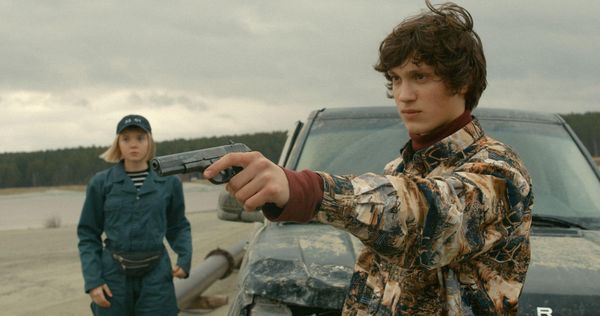Eye For Film >> Movies >> In Limbo (2021) Film Review
In Limbo
Reviewed by: Amber Wilkinson

From Russia, with young love, comes this anthem for doomed youth from Aleksandr Hant, which, presumably because he took on writing duties himself this time (with Vladislav Malakhov) , has a considerably more serious tone than his blackly comic debut How Viktor "The Garlic" Took Alexey The Stud To The Nursing Home. Both films, however, have in common the rebellious energy of youth, an unconventional road trip and the disconnect between the different generations.
Limbo spaces are present from the start, physical places, like walls in between the brutalist blocks, where faded posters and wanted ads flutter or graffiti captures half-finished thoughts, and emotional no-man's lands that have opened up between parents and children at the same time as the yawning gap of adolescence appears between child- and adulthood. Adding to the sense this taking place in the real world - something that operates along very different rules than the personal universe two teenagers will soon create - is an apparent documentary element, used occasionally, through the story, in which people share their thoughts on life directly camera.

It's in the limbo of a party, when both Sasha (Jenia Vinogradova) and Danny (Igor Ivanov) are sitting with their backs against opposite walls gazing into space that these two souls meet and quickly get down to physical business, sex perhaps offering the fast-track potential of 'adulthood'. They're interrupted, however, when Sasha's mother (Olga Sakhanova) and policeman stepfather (Konstantin Gatsalov) arrive to cart her off home.
Home for both teens is less a refuge than a cage. In Danny's case, it's a gilded one, where he is stifled by his overprotective mother (Janna Pugacheva), who has smothered their apartment in flower print in the same way she drowns him with concern. Sasha, on the other hand, may have staged her own mini bedroom revolution but she's about to be confined to quarters over her latest escapade as her parents threaten her with homeschooling. What else to do then, but run away from all this tyranny?
It's Sasha's idea, of course, the meeker Danny initially seen trailing in her wake, although Hant finds interesting ebbs and flows in the power balance between them, particularly once a gun and a car become involved. The performances from Vinogradova and Ivanov are also carefully calibrated to reflect this shifting dynamic, Sasha's confidence starting to flicker with uncertainty and unease as Danny becomes increasingly confrontational.
Hant isn't afraid to mix his tone to reflect this newly created world of the pair. Their energy initially fills the bubble, as they raise their voices in a primal scream against the world and pull off petty crime. Later, things become more serious, as the world they've created for themselves increasingly rubs up against the conventional place everyone else inhabits in dangerous ways. We're not talking about natural born outlaws here, just a couple of kids who are sick of their current lives and who immerse themselves so far in the dream of rebellion they find it increasingly hard to return to the harder reality.
Hant's general playfulness in the pair's initial exploits, bounced along by upbeat music choices, helps to get us onside and their naivety keeps us there, as we realise before they do the degree to which they're playing with fire. Both the failure of adults to resolve things satisfactorily and a haunting epilogue, suggests that, in the end, it's not the teenagers' actions that Hant is really scrutinising, so much as the society that shaped both Sasha and Danny and the triggered the circumstances they find themselves in.
Reviewed on: 14 Oct 2021















